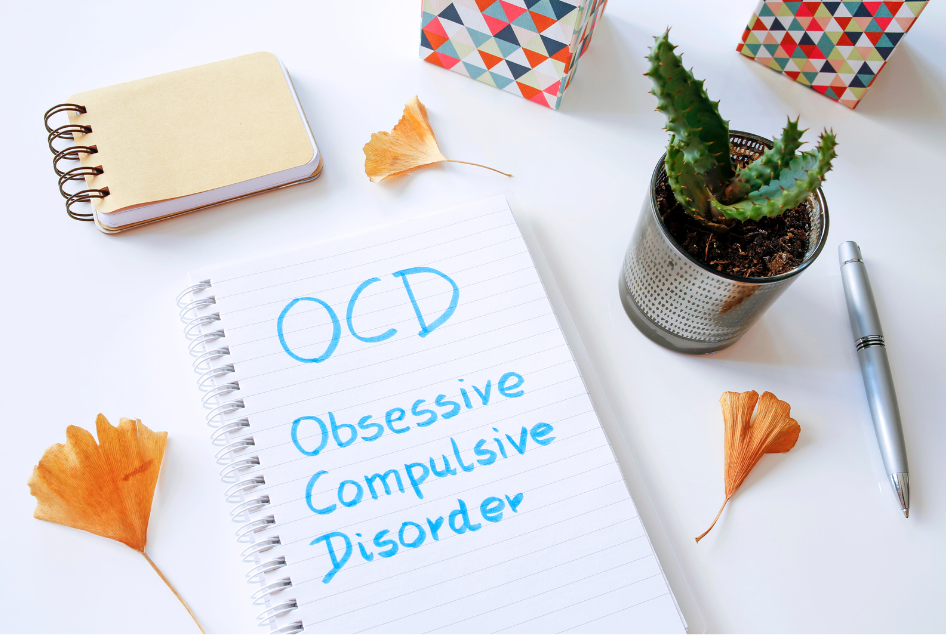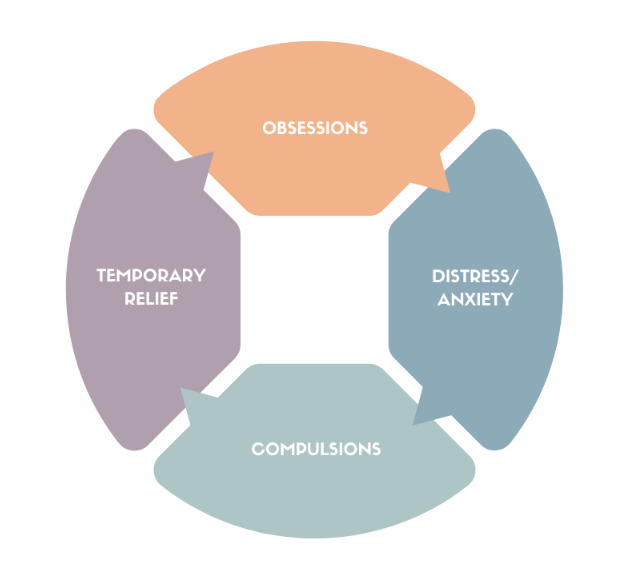Demystifying OCD

Demystifying OCD: What is Obsessive-Compulsive Disorder?
By: Angela Mancao, LSW, LCSW
Obsessive-Compulsive Disorder, commonly known by its abbreviation OCD, is a mental health condition that is often misunderstood.
In fact OCD has recently become an adjective used to describe someone who is organized or concerned with being clean, which adds to the misconception about what it actually is.
So in honor of OCD Awareness Week 2022 (October 9th to 15th), let’s talk more about what OCD is and what it isn’t.
What is OCD?
OCD is an anxiety disorder that affects 1 in 100 adults (which equates to 2 to 3 million adults in the United States) and 1 in 200 children (500,000 children). It affects people regardless of sex, race, ethnicity and background and can happen at any age.
This disorder is characterized by its two distinct parts – obsessions and compulsions. Obsessions and compulsions may be time-consuming, cause anxiety and distress, and impact an individual’s ability to function in their everyday lives.

Obsessions are unwanted, intrusive thoughts or images that can cause someone anxiety and distress. These obsessions frequently stem from an irrational or exaggerated fear.
Some examples of obsessions include:
- Fear of being contaminated
- Fear of harming self or others
- Fear of “going crazy” and “losing control”
- Excessive concern about getting a physical illness
- Fear of harming others by not being careful enough
- Fear of being responsible for something bad happening
- Concern about symmetry, perfectionism, or things being “just right”
- Pervasive sexual thoughts and concerns related to their sexual orientation
- Excessive concern about what is right and wrong
- Excessive worry about offending God
- Worry about the “rightness” of a relationship

Compulsions are the behaviors someone engages in to reduce their anxiety or distress. When people think about OCD compulsions, they frequently think about the visible behaviors, such as handwashing. However, there are also mental compulsions that are not visible to others, where someone engages in mental tasks to reduce their anxiety.
Some examples of compulsions include:
- Excessive washing hands (consider duration and frequency)
- Excessive showering or grooming rituals
- Rearranging things until it is “perfect” or feels “just right”
- Avoiding feared situations
- Confessing
- Apologizing
- Checking things to make sure they prevent any possibility of harm to others or self
- Checking to make sure one didn’t make a mistake
- Repeating behaviors, routines, or activities
Some examples of mental compulsions include:
- “Cancelling” or “undoing” something (e.g. thinking a positive thought to undo a bad thought)
- Counting to end on a “good” or “safe” number or until it feels “just right”
- Ruminating (trying to analyze or solve an unsolvable problem)
- Mental reviewing to ensure one did not harm others
OCD Cycle
The OCD cycle is how OCD is maintained. It begins with an intrusive thought or obsession. People assign a meaning to their thought that makes the thought feel dangerous, meaningful, or true. For instance, “I must be a bad person because I had this thought.” The thought, which would have otherwise been a neutral experience, then becomes negatively charged by the meaning placed upon it, causing distress and anxiety.
In order to reduce the distress, people engage in compulsions. The compulsion will lead to temporary relief – the key word being temporary. Engaging in the compulsion removes the anxiety or discomfort, which then reinforces and strengthens the cycle so that the next time an individual feels anxious, distressed, or discomfort, they feel as though they need to do a compulsion to feel better.

Debunking the OCD Myth
So just to be clear – OCD is not an adjective to describe someone’s cleanliness or organizational preferences.
It is a mental health condition that causes an individual distress because they feel like they MUST do a certain behavior in order to prevent a fear from coming true or to reduce their distress and anxiety.
Individuals with OCD do not like or enjoy engaging in these behaviors.
Treatment for OCD
Exposure and Response Prevention (ERP) is the gold-standard therapeutic modality to work with individuals with OCD. Exposure and response prevention (ERP) is a type of Cognitive Behavioral Therapy (CBT).
In ERP, individuals gradually expose themselves to anxiety-provoking situations and face their fears WITHOUT engaging in their compulsions.
The thought of facing one’s fears is definitely a scary and intimidating one! It is natural to avoid things that make us feel afraid and anxious. However when it comes to OCD, part of treatment is to lean into the feared experiences. By doing so, individuals have the opportunity to learn that they are capable of tolerating anxiety, discomfort, and/or uncertainty and test the beliefs and fears they had about the situation. Trained therapists will work with clients to create a list of anxiety-provoking experiences to expose themselves to that will gradually increase in difficulty.
A Message to Those With OCD
As a mental health professional who works with individuals with OCD, I often hear about how scary it is to talk to someone about your thoughts and behaviors for fear of being misunderstood. Rest assured, trained OCD therapists have heard all sorts of different OCD content.
The fact that you are on this blog suggests you want to learn more about your experiences, which is an amazing first step in the recovery process. OCD may make you feel trapped in its cycle and fearful to do anything but what it says.
You are braver and more capable than what your OCD will have you believe.
While it can be a severe disorder, it is also a treatable one. Right now OCD may feel like a bully that tells you how to live your life, please know that there is hope. There is help out there so that you can gain a better understanding of OCD and how to manage it so you can reclaim your life.
If the thought of ERP terrifies you, remember that you are in charge. You will not be forced to do anything. Your therapist will work with you to make a plan that goes at your pace.
Get started! You won’t regret it.
Resources
- For further information about OCD, the International OCD Foundation (IOCDF) has great resources. The IOCDF website also has a directory of OCD trained therapists, support groups, and other resources that you can find in or near your area. Check out their website here: https://iocdf.org/
- The OCD Stories is a podcast that interviews professionals about their knowledge on OCD-related topics as well as individuals who experience OCD. Access their content here: https://theocdstories.com/
- Our Therapists at the Center for Counseling and Education have extensive training in working with children, teens, and adults with OCD. CFCE therapists are currently providing in-person as well as online therapy. Contact us for more information on how we can support you in your journey toward recovery.
- We are excited to also offer OCD support groups for teens and adults. For more information and to register for an upcoming Group, please check out the More Than My OCD Group page.